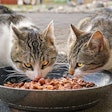The influence of a high-protein (HP) diet on energy balance was evaluated in obese cats allowed ad libitum access to food. Energy intake, body weight, body composition, energy expenditure and concentrations of hormones and metabolites associated with carbohydrate and lipid metabolism (glucose, insulin, free fatty acids, triglycerides and leptin) were measured in cats after consuming either a moderate protein (MP) or HP diet for four months.
Resting and total energy expenditure adjusted for either body weight or lean body mass was increased in cats consuming the HP in relation to MP diets. However, voluntary energy intake also was increased in the HP treatment; thus, there was no difference in body weight between animals consuming the two diets. Dietary protein content did not alter amounts of either lean body mass or fat mass. No significant differences were observed between the two treatment groups for blood glucose, free fatty acid or leptin concentrations, although there was a trend toward an increase of serum insulin concentrations in the cats eating the HP diet.
Short-term ad libitum feeding of an HP diet did not reduce food intake or promote weight loss in obese cats, but energy expenditure was increased. This effect might help promote weight loss when energy intake is restricted.
Source : A. Wei et al., 2010. Influence of a high-protein diet on energy balance in obese cats allowed ad libitum access to food. JAPAN online October 2010. doi: 10.1111/j.1439-0396.2010.01062.x

















